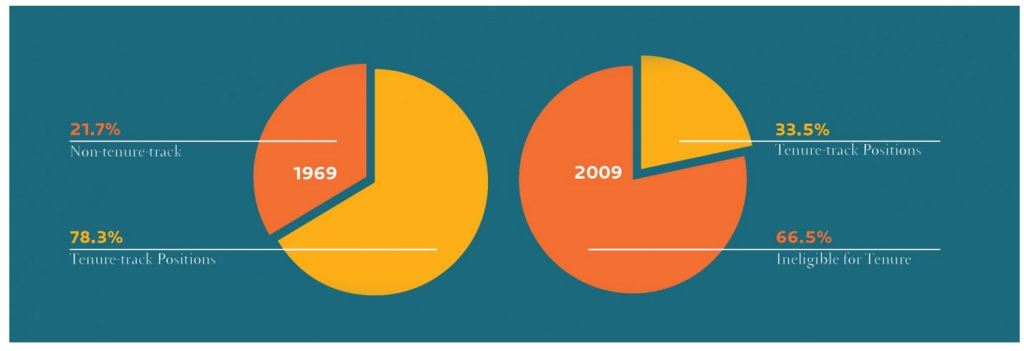Data on faculty composition in higher education:
1969: 21.7% non-tenure track and 78.3% tenure-track positions.
2009: 66.5% ineligible for tenure and 33.5% tenure-track positions.[1]
Three questions about quality in higher education, in light of the data.
1. Do adjuncts or tenure-trackers deliver better instruction? Adjuncts tend to be younger, hungrier, more excited about being instructors, and more cutting-edge; while tenured faculty can be older, settled, lazy, and outdated. Or is it that adjuncts are greener and naïve while the tenured are seasoned and wiser?
2. The politicization of the faculty is also often implicated in lower academic quality. Does the increased reliance on adjuncts mitigate the politicization by bringing in instructors who are not as beholden to the administration or the tenured faculty? Or does it make the politicization worse by concentrating power with the relatively fewer and more-likely-to-be-politicized tenured faculty?
3. Will the new technologies accelerate the more-adjuncts trend, as the technologies improve and as more instructors and students become more proficient with them? For example, if new technologies enable education that is Q in quality and P in price while traditional education is 2Q in quality but 10P in price — then will the technologies prove disruptive?
Source:
[1] Adrianna Kezar and Daniel Maxey, “The Changing Academic Workforce,” Association of Governing Boards of Colleges and Universities’ Trusteeship Magazine, May/June 2013.

Answers to all questions depend on the subject, department, school, and needs of the attendees, no?
During my undergraduate years I found adjunct professors were much better teachers than tenured ones. Their courses were much more structured, lectures were clear, concise, and understandable. They were overall more competent than established professors.